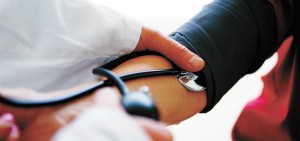By Christopher A. Santora M.D. –
 The treatment of hypertension is the most common reason for physician office visits of non-pregnant adults in the United States and for use of prescription drugs. A national health survey (National Health and Nutrition Examination Survey) conducted from 2005 to 2008 estimated 31% of adults, 65 million persons, in the US have hypertension and 51% of persons diagnosed with hypertension are not well controlled.
The treatment of hypertension is the most common reason for physician office visits of non-pregnant adults in the United States and for use of prescription drugs. A national health survey (National Health and Nutrition Examination Survey) conducted from 2005 to 2008 estimated 31% of adults, 65 million persons, in the US have hypertension and 51% of persons diagnosed with hypertension are not well controlled.
Definition for hypertension was established in 2003, by the seventh report of the Joint National Committee, as blood pressure greater than or equal to 140/90 measured on 2 visits after an initial screen. However, diagnosis may be made earlier depending on level of severity.
What symptoms will I feel when I have hypertension?
Unlike many disease processes hypertension is usually present with NO symptoms and thus goes undetected. Onset of symptoms may be associated with severe disease. This underscores the importance of regular screening visits with your physician or with regular home blood pressure monitoring.
What guides antihypertensive therapy?
Treatment is guided by what we observe in clinical trials and individualized for each patient depending on concurrent disease. This may require starting antihypertensive medications immediately with lifestyle modification versus trial of lifestyle modification alone.
What are the BENEFITS of treatment?
-Up to 25% reduction of risk for heart failure and
heart attack
-Up to 40% risk reduction for stroke.
Following diagnosis your doctor can identify risk factors with you and evaluate for end organ damage with diagnostic testing.
What does my lifestyle have to do with my blood pressure?
The things you do and the foods you eat have a big effect on your blood pressure and your overall health. Following the right lifestyle can lower your blood pressure, make medicines for high blood pressure work better, and lower the chances that you’ll have a heart attack or stroke or develop kidney disease.
-Weight reduction (diet and exercise)
-DASH eating plan: Choose a diet rich in fruits, vegetables, and low-fat dairy products, and low in meats, sweets, and refined grains
-Low salt diet
-Limit alcohol use: 2 drinks for men and 1 drink for females daily
-Moderate exercise: Do something active for at least 30 minutes a day on most days of the week
What are the risks of NOT treating
hypertension?
Risk factors for untreated hypertension
-Premature onset of cardiovascular disease, ischemic and hemorrhagic stroke, chronic kidney disease and end-stage renal disease requiring dialysis.
What preventative measures can I take?
-Schedule an annual screening exam with your medical provider
-Lifestyle modification
Where do I start?
The changes discussed above might sound like a lot, but don’t worry. You don’t have to change everything all at once. The key to improving your lifestyle is to “start low and go slow.” Choose one small, specific thing to change and try doing it for a while. If it works for you, keep doing it until it becomes a habit. If it doesn’t, don’t give up. Choose something else to change and see how that goes.
As you find things that you are able to change and stick with, keep adding new changes. In time, you will see that you can actually change a lot. You just have to get used to the changes slowly.
If you already have hypertension… Partner with your physician to determine the best approach to antihypertensive therapy.
For over 20 years, Personal Physician Care, PA has been the leader in delivering personal quality medical care. PPCare provides its patients with highly experienced primary care physicians and an array of advantages from 24/7 on call services to on site lab work and diagnostic as well as emergency same day appointments and courtesy transportation. When it comes to managing your hypertensioncomprehensive evidence based care to achieve treatment goals and minimize risk of comorbid disease processes.
Personal Physician Care
561-498-5660
www.PPCARE.net
Check Also
Sensational News! The most powerful Hyper Pulsed Laser comes to Palm Beach County!
In an era where age-related lumbar spinal stenosis has reached epidemic proportions, a revolutionary treatment …
 South Florida Health and Wellness Magazine Health and Wellness Articles
South Florida Health and Wellness Magazine Health and Wellness Articles




